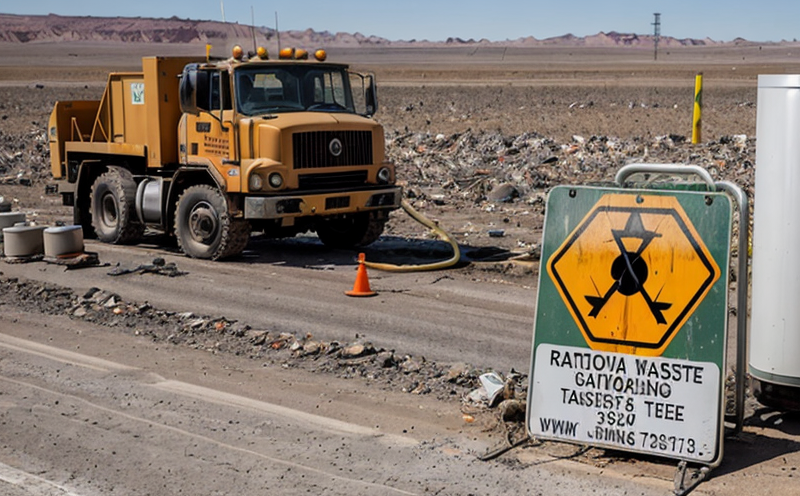ISO 6961 Solidified Waste Product Testing by Leaching
The ISO 6961 standard provides a robust framework for assessing the leachability of radioactive waste products that have been solidified into stable forms such as cement or bituminous materials. This service is critical in ensuring compliance with regulatory standards and environmental protection requirements, particularly in sectors like nuclear power generation, decommissioning facilities, and hazardous waste management.
The testing method outlined in ISO 6961 involves leaching the solidified waste under controlled conditions to simulate real-world scenarios where contaminants might migrate into surrounding environments. This process helps determine whether the waste form is capable of maintaining its integrity over extended periods, thereby minimizing the risk of environmental contamination and ensuring public safety.
Leaching tests are essential in characterizing radioactive waste products because they provide insights into the potential pathways for radionuclides to enter the environment. By understanding these pathways, stakeholders can make informed decisions regarding storage, transport, and disposal methods that minimize risks. The results of ISO 6961 testing are vital inputs for regulatory compliance reports, environmental impact assessments, and waste management strategies.
The methodology employed in this service ensures consistency and accuracy across different laboratories by adhering strictly to the procedures outlined in ISO 6961. This includes precise control over leaching conditions such as temperature, time, pH levels, and solution composition. The use of standardized solutions allows for comparability between results from various facilities.
The testing process typically begins with the preparation of samples by cutting solidified waste into small pieces that can be submerged in leachate. These samples are then placed in containers designed to maintain specific environmental parameters during the test period. Over time, the leachate is monitored for changes in chemical composition and radionuclide concentrations.
The results from these tests provide critical information about the effectiveness of different waste forms in containing radioactive materials over extended periods. This knowledge can be used to optimize waste management practices, improve the design of containment structures, and enhance overall environmental protection efforts.
Adherence to ISO 6961 ensures that testing laboratories meet international standards for accuracy and reliability, which is crucial given the high stakes involved in radioactive waste management. Compliance with these standards helps build trust among regulatory bodies, stakeholders, and the public regarding the safety of nuclear facilities and waste disposal sites.
Our expertise in conducting ISO 6961 tests ensures that clients receive accurate, reliable data that can be used to make informed decisions about their operations. By leveraging this service, organizations involved in nuclear power generation, decommissioning, or hazardous waste management can ensure they meet all relevant regulatory requirements while minimizing potential risks associated with radioactive contamination.
Applied Standards
| Standard Number | Title | Description |
|---|---|---|
| ISO 6961-1 | Leaching of radioactive waste products from solidified forms - Part 1: General principles and procedures | This part provides the general framework for conducting leaching tests on solidified waste forms according to ISO 6961. |
| ISO 6961-2 | Leaching of radioactive waste products from solidified forms - Part 2: Determination of radionuclide release in aqueous leachate | This part specifies the procedures for measuring radionuclide concentrations in the leachate obtained from ISO 6961-1 tests. |
| ISO 6961-3 | Leaching of radioactive waste products from solidified forms - Part 3: Determination of chemical composition of leachate | This part outlines methods for analyzing the chemical composition of the aqueous leachate produced during ISO 6961 tests. |
Scope and Methodology
The scope of this service encompasses all aspects related to the testing of solidified radioactive waste products for their ability to retain radionuclides within specified limits. This includes both the procedural guidelines provided in ISO 6961 as well as the technical apparatus required for accurate measurement.
- Proper sample preparation
- Controlled leaching conditions (temperature, time, pH)
- Ongoing monitoring of leachate composition
- Data analysis and reporting
The methodology involves carefully preparing the solidified waste samples in accordance with ISO 6961 requirements. Once prepared, these samples are immersed in a defined volume of aqueous solution designed to mimic environmental conditions under which they may encounter leaching processes.
During the test period, rigorous monitoring ensures that all parameters remain within acceptable ranges as specified by the standard. At regular intervals throughout this period, aliquots of the leachate are collected and analyzed using appropriate analytical techniques such as gamma spectrometry for radionuclide quantification and atomic absorption spectroscopy for chemical analysis.
The final step in the process involves compiling all gathered data into comprehensive reports that summarize findings and draw conclusions regarding the performance of each tested waste form. These reports serve multiple purposes, including compliance documentation, research and development projects, educational materials, and strategic planning documents.
Use Cases and Application Examples
- Compliance with regulatory requirements for radioactive waste management in nuclear facilities
- Evaluation of new waste forms before their implementation at existing sites
- Assessment of the effectiveness of different containment materials used during decommissioning processes
- Demonstration of compliance with international treaties and agreements regarding radioactive waste disposal
- Development of improved waste management practices through continuous evaluation and refinement based on test results
- Educational purposes, including training programs for professionals involved in nuclear power generation or hazardous waste handling
- Strategic planning exercises aimed at identifying potential risks associated with various waste forms and developing mitigation strategies accordingly
In practice, ISO 6961 testing has been instrumental in ensuring that radioactive waste products remain safely contained even under challenging environmental conditions. By providing detailed insights into the behavior of these materials over time, this service enables stakeholders to make well-informed decisions about how best to manage them.





